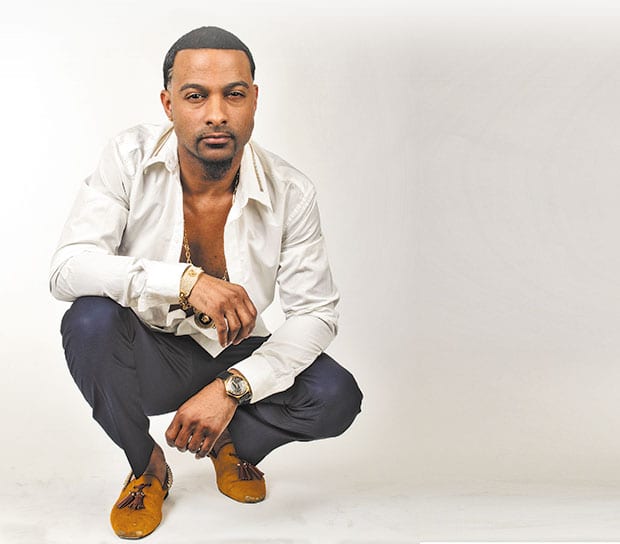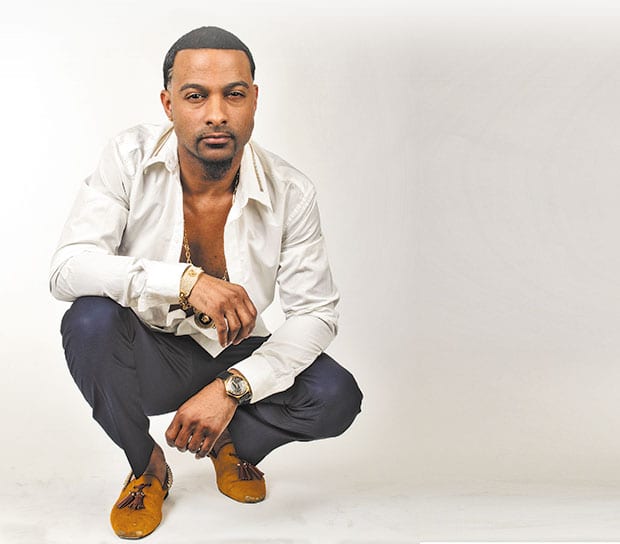For Ahmad Goree, Juneteenth is the perfect combo of black pride, gay pride

Tammye Nash | Managing Editor
Juneteenth is “the oldest known celebration commemorating the end of slavery in the United States,” according to the website, Juneteenth.com. It marks the day — June 19, 1865 — that Union soldiers led by Maj. Gen. Gordon Granger landed in Galveston and announced that slavery was ended.
Yes, that announcement came more than two years after President Lincoln issued the Emancipation Proclamation. But it marked, at least in Texas, the real beginning of freedom for the men and women brought to this country, or born here, in chains, to be bought and sold and used as property.
So the month of June is special to African-Americans in the South, especially those in Texas. But for LGBT and same-gender-loving African- Americans, the month is doubly special: it is also national LGBT Pride Month. That’s why, according to Ahmad Goree, Dallas Southern Pride’s annual Juneteenth celebration is one of the fastest-growing Black Pride events around.
Goree, communications manager for Dallas Southern Pride, said the Juneteenth party holds a special place in his heart.
“It’s really an enlightening activity,” Goree said. “I mean, it brings together Juneteenth and Pride Month. Those two connections are both really important to me, so celebrating them both at the same time — being African-American and being gay — it’s something I look forward to every year, somewhere I can feel welcome and share experiences with people like me.”
Goree was born and reared in Dallas, graduating from Spruce High School in Pleasant Grove before heading east to Hawkins, just north of Tyler, where he attended Jarvis Christian College.
Along the way to earning his bachelor’s degree in history from Jarvis, Goree had the chance to spend time studying abroad in the Dominican Republic. It was, he said, “an amazing experience.”
“It was truly a life-changing experience,” Goree said of his time abroad. “I had the chance to learn so much about the Latin American culture. I learned so much about the way of living in a third-world country, and I really learned to appreciate so many of the things we take for granted here in the U.S. Like hot water, for example. That’s a luxury not everybody has in the Dominican Republic, and I learned to really appreciate it when I had the chance there to take a hot shower.
“It really was a special time,” he added. “I would tell everybody, any time you are able to experience another culture, take advantage of that chance.”
Goree said he really enjoyed the “high-end research on different topics, mainly politics and policy, that was required to earn his bachelor’s in history.
He had the chance to intern for a U.S. congressman, and then he went back to school — this time at Dallas Baptist University — to get his master’s degree in political science.
For a young man who had come out as gay in high school, choosing “Christian” schools for his college education may seem like an odd decision. But Goree said he didn’t really have any difficulties at either school because of his sexual orientation.
First, he said, despite it’s name, Jarvis wasn’t the typical conservative “Christian” school. “The only thing ‘Christian’ about Jarvis was the name,” Goree chuckled. “And I wasn’t out there announcing to everybody that I was gay. People knew, though, and it wasn’t a problem.”
And at DBU, “I went to classes at night, so it wasn’t the same as being there all day every day. But DBU is a very political school, at least it was then.
That was during the Kerry/Bush election, so I did have a lot of debates with some of my classmates — all around religion and politics and race issues.”
Fresh out of grad school, Goree went to work for the city of Dallas’ Environmental Health Services department, helping initiate an ex-offender re-entry program, helping those coming out of jail adjust to life on the outside again. From there, he went to work for state Sen. Royce West as a senior policy analyst in the lawmaker’s Dallas and Austin offices.
Then in 2008, Goree moved to South Carolina to work as a surrogate coordinator for Barack Obama’s first presidential campaign. It was, he said, “a dream come true. I had always wanted to work for a president.”
Currently, Goree works as chief of marketing and outreach and is a public information officer for the U.S. Small Business Administration, and he’s begin working on his doctorate in urban planning and public policy at the University of Texas at Arlington.
“I try to stay busy,” he said. “I love learning new things and being involved.”
That goes for his civic life as well as his career. Goree lives in DeSoto and serves on the DeSoto Citizens Council, an organization that promotes education among DeSoto High School students by raising money to fund scholarships for them. He also started an organization called Citizens Involvement which stages town halls to help people learn to be more involved in the government and civic life of their communities.
“One of the main things we talk about is how to serve on grand juries,” he said. “A lot of people don’t know that if you are old enough to vote, you can serve on a grand jury. They think you have to be a lawyer but you don’t. And being on a grand jury is an opportunity to be a part of something, it’s a place to start. We also talk about getting involved in other community events, about getting on boards and commissions and even running for office.
But we start with the grand juries.
“People are always complaining about a lack of fairness” Goree added. “Well, let’s stop complaining and start serving. It’s a simple process, really. The opportunities to serve are out there.”
Goree keeps busy in the LGBT community, too. He has worked with Stonewall Democrats and also with Abounding Prosperity Inc., a nonprofit founded in 2005 focused on providing services to address health, social and economic disparities among black men, with a particular emphasis on gay, bisexual and male-to-female transgender individuals. It was his work with Abounding Prosperity — led by CEO Kirk Meyers — that prompted him to get involved with Dallas Southern Pride, also headed up by Meyers.
“I’ve always known about Dallas Southern Pride,” Goree said. “I remember going out to the Metro in downtown Dallas when they had events there.
Now it’s under Kirk’s leadership, and he is a mentor of mine and leader in the community. So when he took over, I wanted to be more involved.
“I think, by combining our skills, we can have a big impact, not just in the LGBT African-American community, but in the black community as a whole.”
While Dallas Southern Pride has long been known for its annual Black Pride celebration held each fall, over the first weekend in October, now that the organization has taken over planning for the Juneteenth celebration, the summer event is quickly becoming DSP’s main event.
“The whole idea of it is celebrating life and unity and freedom,” Goree said. “Juneteenth is a significant event in Texas history, and it just so happens to be in the same month as Pride. It gives LGBT African-Americans a chance to celebrate life and unity together and be comfortable doing it. Black LGBT people still have problems being within our own families, so Dallas Southern Pride’s Juneteenth is a chance to come and celebrate together and be free, to feel free.
“There were times that I have experienced discrimination,” Goree continued. “You know, being looked at a certain way because I am African-American. And I have experienced discrimination for being gay, even within the African-American community. I’ve had people make fun of me for being gay. But Juneteenth pulls us away from all of that. It gives me the chance to feel appreciated for being exactly who I am — for being African-American, for being gay.”
The event, he said, “has the significance of freedom and unity. It is the chance to feel free myself and to see my brothers and my sisters — gay, transgender and lesbian — feeling the same way.”
This article appeared in the Dallas Voice print edition June 16, 2017.

